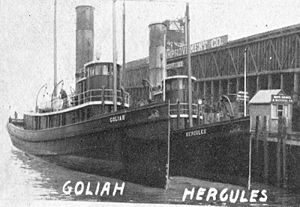USS Goliah (SP-1494), also listed as ID-1494, was an armed tug that served in the United States Navy as a patrol vessel and tug from 1918 to 1919.
 Goliah with her sister ship, Hercules
| |
| History | |
|---|---|
| Name | USS Goliah |
| Namesake | Previous name retained |
| Builder | John H. Dialogue and Sons, Camden, New Jersey |
| Completed | 1907 |
| Acquired | 6 December 1917 |
| Commissioned | 31 January 1918 |
| Decommissioned | 29 November 1919 |
| Fate |
|
| Notes | Operated as commercial tug SS Goliah 1907-1917 and from 1919 |
| General characteristics | |
| Type | Tug and patrol vessel |
| Tonnage | 414 tons |
| Length | 135 ft (41 m) |
| Beam | 27 ft 1 in (8.26 m) |
| Draft | 16 ft (4.9 m) |
| Propulsion | Steam engine |
| Speed | 13 knots |
| Armament |
|
SS Goliah was built as a commercial tug in 1907 by John H. Dialogue and Sons at Camden, New Jersey. The Navy purchased her from her owners, the Puget Sound Tug Company of Seattle, Washington, on 6 December 1917 for World War I service. She was commissioned as USS Goliah (SP-1494) on 31 January 1918 at Mare Island Navy Yard at Vallejo, California.
Following shakedown, Goliah towed coal barges between San Diego, California; Mare Island Navy Yard; and San Pedro, California, until 3 March 1918, when she departed San Diego for the United States East Coast. She arrived at Norfolk, Virginia, on 8 April 1918 and during the next month made four voyages between New London, Connecticut, and New York City with stores and ammunition. After a voyage to Bermuda and the Azores between 18 May 1918 and 24 June 1918 as an escort tug, she arrived at New York City for overhaul, where she stayed until 8 August 1918. She then briefly served at New London as a patrol craft.
Departing New London on 6 September 1918, Goliah operated as a towing ship between São Miguel Island[1] in the Azores, Bermuda, and New London until arriving at Brest, France on 26 November 1918. There she took up new duties as a rescue and towing tug for convoys operating out of Brest to English ports and occasionally to Copenhagen, Denmark, and Lisbon, Portugal, until she arrived back at Brest on 24 April 1919.
Goliah performed harbor towing work at Brest until she was decommissioned on 29 November 1919.
The U.S. Navy loaned Goliah to the United States Shipping Board on 30 November 1919 and transferred her to the Shipping Board's permanent custody and control on 7 October 1921.
Notes
edit- ^ The Dictionary of American Naval Fighting Ships (see http://www.history.navy.mil/danfs/g6/goliah.htm) states that this port was "San Miguel," but provides no indication of which specific port it is referring to as "San Miguel." It is almost certain that this actually is a reference to São Miguel Island in the Azores, where the United States Navy and United States Marine Corps based forces during World War I
References
edit- This article incorporates text from the public domain Dictionary of American Naval Fighting Ships. The entry can be found here.
- NavSource Online: Section Patrol Craft Photo Archive Goliah (SP 1494)